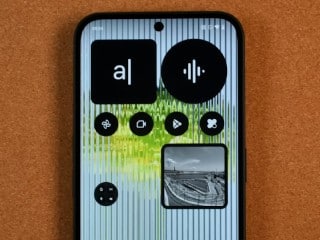- Home
- Science
- Science News
- Ultra Thin Gold Sensor for Direct Use on Skin Without Irritation, Discomfort Developed by Researchers
Ultra-Thin Gold Sensor for Direct Use on Skin Without Irritation, Discomfort Developed by Researchers
The main component of the sensor is fine gold mesh large surface for a potential disease biomarker to bind to.

The sensor can evaluate different biomarkers to perform body chemical analysis
According to a recent study, a group of researchers have developed a unique, gold-spun, ultra-thin sensor that can be placed directly on the skin without irritation or discomfort.
The findings of the study were published in the journal Advanced Optical Materials.
The ultrathin sensor can evaluate different biomarkers or substances to perform body chemical analysis. It works using a Raman spectroscopy technique, where laser light aimed at the sensor is changed slightly depending on whatever the chemicals at that point are present on the skin. The sensor can be tuned finely to be extremely sensitive, and it's robust enough for practical use.
Wearable technology is nothing new. Perhaps you or someone you know wears a smartwatch.
Many of these can monitor certain health matters such as heart rate, but at present, they cannot measure chemical signatures which could be useful for medical diagnosis. Smartwatches or more specialised medical monitors are also relatively bulky and often quite costly. Prompted by such shortfalls, a team comprising researchers from the Department of Chemistry at the University of Tokyo sought a new way to sense various health conditions and environmental matters in a noninvasive and cost-effective manner.
"A few years ago, I came across a fascinating method for producing robust stretchable electronic components from another research group at the University of Tokyo," said Limei Liu, a visiting scholar at the time of the study and currently a lecturer at Yangzhou University in China. "These devices are spun from ultrafine threads coated with gold, so can be attached to the skin without issue as gold does not react with or irritate the skin in any way. As sensors, they were limited to detecting motion however, and we were looking for something that could sense chemical signatures, biomarkers and drugs. So we built upon this idea and created a noninvasive sensor that exceeded our expectations and inspired us to explore ways to improve its functionality even further."
The main component of the sensor is the fine gold mesh, as gold is unreactive, meaning that when it comes into contact with a substance the team wishes to measure -- for example a potential disease biomarker present in sweat -- it does not chemically alter that substance. But instead, as the gold mesh is so fine, it can provide a surprisingly large surface for that biomarker to bind to, and this is where the other components of the sensor come in. As a low-power laser is pointed at the gold mesh, some of the laser light is absorbed and some is reflected. Of the light reflected, most has the same energy as the incoming light. However, some incoming light loses energy to the biomarker or other measurable substance, and the discrepancy in energy between reflected and incident light is unique to the substance in question. A sensor called a spectrometer can use this unique energy fingerprint to identify the substance. This method of chemical identification is known as Raman spectroscopy."
Currently, our sensors need to be finely tuned to detect specific substances, and we wish to push both the sensitivity and specificity even further in future," said Assistant Professor Tinghui Xiao. "With this, we think applications like glucose monitoring, ideal for sufferers of diabetes, or even virus detection, might be possible." "There is also potential for the sensor to work with other methods of chemical analysis besides Raman spectroscopy, such as electrochemical analysis, but all these ideas require a lot more investigation," said Professor Keisuke Goda. "In any case, I hope this research can lead to a new generation of low-cost biosensors that can revolutionise health monitoring and reduce the financial burden of health care."
Get your daily dose of tech news, reviews, and insights, in under 80 characters on Gadgets 360 Turbo. Connect with fellow tech lovers on our Forum. Follow us on X, Facebook, WhatsApp, Threads and Google News for instant updates. Catch all the action on our YouTube channel.
Related Stories
- Samsung Galaxy Unpacked 2026
- iPhone 17 Pro Max
- ChatGPT
- iOS 26
- Laptop Under 50000
- Smartwatch Under 10000
- Apple Vision Pro
- Oneplus 12
- OnePlus Nord CE 3 Lite 5G
- iPhone 13
- Xiaomi 14 Pro
- Oppo Find N3
- Tecno Spark Go (2023)
- Realme V30
- Best Phones Under 25000
- Samsung Galaxy S24 Series
- Cryptocurrency
- iQoo 12
- Samsung Galaxy S24 Ultra
- Giottus
- Samsung Galaxy Z Flip 5
- Apple 'Scary Fast'
- Housefull 5
- GoPro Hero 12 Black Review
- Invincible Season 2
- JioGlass
- HD Ready TV
- Latest Mobile Phones
- Compare Phones
- Tecno Pova Curve 2 5G
- Lava Yuva Star 3
- Honor X6d
- OPPO K14x 5G
- Samsung Galaxy F70e 5G
- iQOO 15 Ultra
- OPPO A6v 5G
- OPPO A6i+ 5G
- Asus Vivobook 16 (M1605NAQ)
- Asus Vivobook 15 (2026)
- Brave Ark 2-in-1
- Black Shark Gaming Tablet
- boAt Chrome Iris
- HMD Watch P1
- Haier H5E Series
- Acerpure Nitro Z Series 100-inch QLED TV
- Asus ROG Ally
- Nintendo Switch Lite
- Haier 1.6 Ton 5 Star Inverter Split AC (HSU19G-MZAID5BN-INV)
- Haier 1.6 Ton 5 Star Inverter Split AC (HSU19G-MZAIM5BN-INV)






![[Partner Content] OPPO Reno15 Series: AI Portrait Camera, Popout and First Compact Reno](https://www.gadgets360.com/static/mobile/images/spacer.png)









